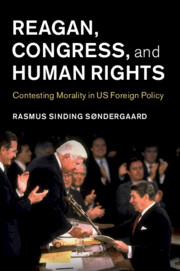Book contents
- Reagan, Congress, and Human Rights
- Human Rights in History
- Reagan, Congress, and Human Rights
- Copyright page
- Contents
- Figures
- Acknowledgments
- Abbreviations
- Introduction
- 1 After the Breakthrough
- 2 The Reagan Turnaround on Human Rights
- 3 The Congressional Human Rights Caucus and the Limits of Bipartisanship
- 4 The Right to Leave
- 5 “A Universal Human Rights Issue”
- 6 Two Tales of Human Rights
- Conclusion
- Bibliography
- Index
Introduction
Published online by Cambridge University Press: 27 March 2020
- Reagan, Congress, and Human Rights
- Human Rights in History
- Reagan, Congress, and Human Rights
- Copyright page
- Contents
- Figures
- Acknowledgments
- Abbreviations
- Introduction
- 1 After the Breakthrough
- 2 The Reagan Turnaround on Human Rights
- 3 The Congressional Human Rights Caucus and the Limits of Bipartisanship
- 4 The Right to Leave
- 5 “A Universal Human Rights Issue”
- 6 Two Tales of Human Rights
- Conclusion
- Bibliography
- Index
Summary
Commitment to human rights concerns as an important element in US foreign policy hung in the balance in the 1980s. Far from being the tacitly presumed self-evident truths of today, human rights, and the degree to which respect for these ought to inform American foreign relations, was a highly contested subject.1 The 1970s had witnessed a breakthrough for human rights concerns in US foreign policy, emerging in Congress during the Nixon administration and culminating with the presidency of Jimmy Carter, who made human rights the centerpiece of his foreign policy.2 At first, it seemed unlikely that the breakthrough would continue in a decade where President Ronald Reagan proclaimed he would undo the human rights-based foreign policy of his predecessor. At the new administration’s first National Security Council meeting on February 6, 1981, Reagan declared: “We must change the attitude of our diplomatic corps so that we don’t bring down governments in the name of human rights […] We don’t throw out our friends just because they can’t pass the ‘saliva test’ on human rights.”3 In the following months, the administration’s rhetoric, diplomacy, and bureaucratic appointments reinforced the intent to downgrade human rights.
- Type
- Chapter
- Information
- Reagan, Congress, and Human RightsContesting Morality in US Foreign Policy, pp. 1 - 13Publisher: Cambridge University PressPrint publication year: 2020

